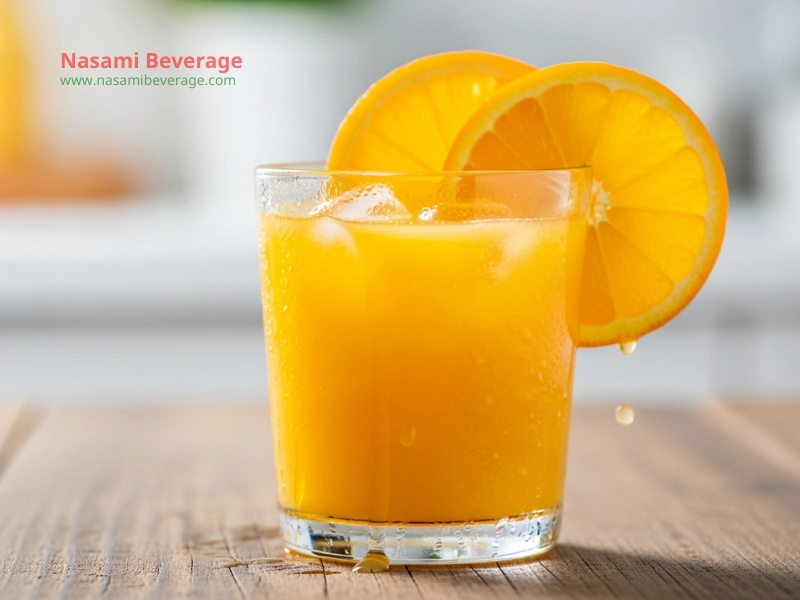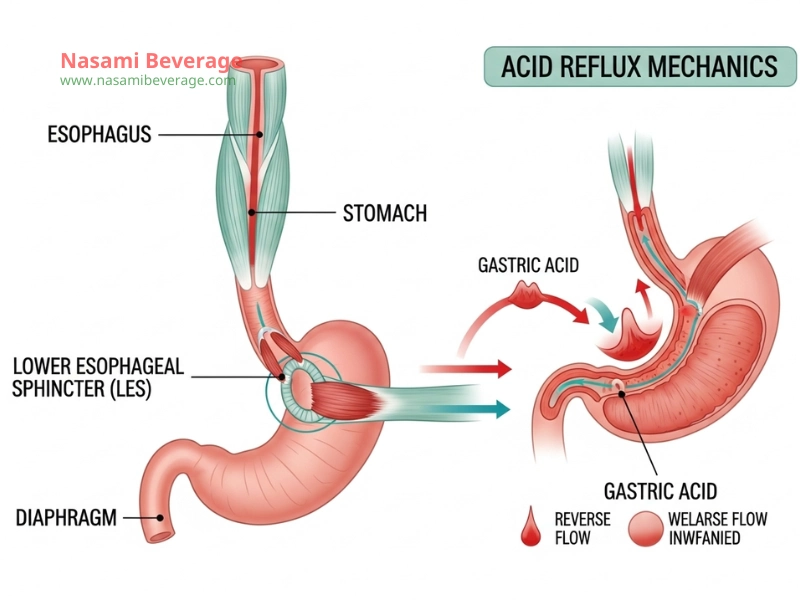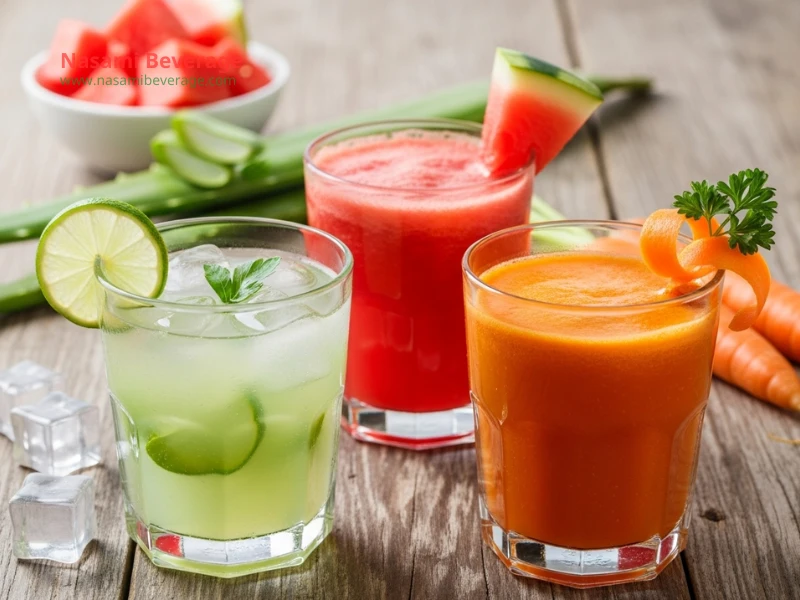Is orange juice bad for acid reflux? This question troubles millions who love their morning glass of citrusy goodness but struggle with heartburn or GERD. At Nasami Beverage, we understand the importance of enjoying refreshing drinks without compromising your digestive health. In this article, we explore whether orange juice triggers acid reflux, debunk common myths, and share expert tips on managing GERD with diet and lifestyle changes. From low-acid juice alternatives to practical solutions, we’ve got you covered to make informed choices for your well-being.
Understanding Acid Reflux and GERD
What Is Acid Reflux?
Acid reflux occurs when stomach acid flows back into the esophagus, causing discomfort like heartburn or a sour taste. When this happens frequently, it’s called gastroesophageal reflux disease (GERD), affecting about 20% of U.S. adults, according to the National Institute of Diabetes and Digestive and Kidney Diseases (NIDDK).
The lower esophageal sphincter (LES), a muscle that acts as a valve between the stomach and esophagus, plays a key role. If the LES weakens or relaxes at the wrong time, acid can escape, irritating the esophageal lining.
Symptoms include burning in the chest, regurgitation, and sometimes difficulty swallowing. Understanding these basics helps explain why certain foods, like orange juice, might cause issues for some people.
Common Triggers of Acid Reflux
Certain foods and drinks can relax the LES or increase stomach acid, worsening acid reflux. Common culprits include spicy foods, caffeine, chocolate, and citrus fruits like oranges.

Acidic beverages, with a pH below 4, are particularly problematic because they can irritate the esophagus directly or stimulate excess acid production.
Lifestyle factors, such as eating large meals or lying down soon after eating, also contribute. Identifying these triggers is crucial for managing symptoms effectively.
Why Orange Juice May Worsen Acid Reflux
The Acidity of Orange Juice
Orange juice, with a pH of 3 to 4, is highly acidic, which can aggravate acid reflux symptoms. A study published in Gastroenterology Research and Practice found that 73% of GERD patients reported heartburn after consuming citrus juices like those from Tropicana or Minute Maid.

The citric acid in orange juice can irritate the esophageal lining, especially in those with a sensitive digestive system. Brands like Simply Orange, which offer “natural” juices, still contain similar acidity levels, making them risky for GERD sufferers.
How Citrus Affects the Esophageal Sphincter
Citrus fruits and juices may relax the LES, allowing stomach acid to flow upward. This effect varies by individual, as factors like the amount consumed and timing matter.
For example, drinking orange juice during a meal might be less triggering than on an empty stomach, where acid has less food to buffer it. Nasami Beverage recommends diluting citrus juices or opting for low-acid alternatives to minimize this risk.
Can You Drink Orange Juice with Acid Reflux?
When Orange Juice Might Be Tolerable
Not everyone with acid reflux needs to avoid orange juice entirely. Small amounts, especially when diluted with water or mixed with alkaline foods like bananas, may be tolerable for some.

Consuming orange juice with a meal can also help, as food buffers the acid’s impact on the stomach and esophagus.
Nasami Beverage suggests experimenting cautiously with brands like simply orange acids to find your tolerance level, but always consult a doctor if symptoms persist.
Risks of Drinking Orange Juice on an Empty Stomach
Drinking orange juice on an empty stomach can increase acid reflux risk. Without food to absorb the acid, the stomach’s pH drops, and the LES may relax, leading to heartburn.
A study in The American Journal of Gastroenterology noted that acidic beverages consumed alone amplify esophageal irritation. To enjoy orange juice safely, pair it with neutral foods like oatmeal or whole-grain toast to stabilize stomach acid.
Alternatives to Orange Juice for Acid Reflux Sufferers
Low-Acid and Alkaline Juices
For those wondering, “Is orange juice bad for acid reflux?” the answer often lies in finding gentler alternatives. Low-acid juices like aloe vera, watermelon, or carrot juice are excellent choices.
Aloe vera juice, in particular, has soothing properties for the esophagus, while watermelon juice is hydrating and neutral. Nasami Beverage offers a range of low-acid juice blends designed to support digestive health without triggering GERD symptoms.
Herbal Teas and Other Soothing Beverages
Herbal teas like ginger or licorice root can calm the stomach and reduce acid reflux. Ginger tea, for instance, aids digestion and has anti-inflammatory properties, making it a great choice.

Avoid caffeinated teas, as caffeine can relax the LES. Nasami Beverage recommends non-caffeinated options like chamomile tea for a soothing, GERD-friendly drink.
Practical Tips to Manage Acid Reflux
Dietary Changes to Reduce Symptoms
Adopting a low-acid diet is key to managing acid reflux. Avoid trigger foods like citrus, tomatoes, and carbonated drinks. Instead, focus on alkaline foods such as bananas, melons, and leafy greens.
Nasami Beverage encourages incorporating oats, whole grains, and lean proteins to stabilize stomach acid. For occasional heartburn, over-the-counter remedies like Tums or Prilosec can provide relief, but long-term dietary changes are more effective.
Lifestyle Modifications
Simple habits can make a big difference. Eat smaller, more frequent meals to reduce pressure on the LES. Avoid lying down for at least three hours after eating, and elevate your head during sleep to prevent acid flow.
Maintaining a healthy weight also helps, as excess abdominal fat can weaken the LES. For personalized advice, consult a gastroenterologist to explore options like dietary plans or diagnostic tests.
Myths and Facts About Orange Juice and Acid Reflux
- Myth: Orange juice always causes acid reflux.
- Fact: Tolerance varies; some can handle small amounts, especially when diluted. Myth: All citrus juices are equally harmful.
- Fact: Grapefruit juice may be more triggering than orange juice for some due to its higher acidity.
Understanding these distinctions helps you make informed choices. Nasami Beverage emphasizes testing your limits cautiously and prioritizing low-acid options.
When to Seek Medical Advice
Persistent heartburn, difficulty swallowing, or frequent regurgitation may signal severe GERD. If symptoms occur more than twice a week, consult a doctor for tests like an endoscopy.
Medications like Prilosec can help manage symptoms, but long-term reliance requires medical supervision. Nasami Beverage advises seeking professional guidance to tailor a GERD management plan to your needs.
FAQs
Can I drink orange juice if I have acid reflux?
Small amounts may be tolerable if diluted or consumed with food, but low-acid juices like aloe vera are safer.
What are the best juice alternatives for acid reflux sufferers?
Try watermelon, carrot, or aloe vera juice, which are less likely to irritate the esophagus.
Why does orange juice cause heartburn in some people?
Its low pH and citric acid can relax the LES or irritate the esophagus, especially on an empty stomach.
How can I reduce acid reflux symptoms without giving up citrus fruits?
Dilute citrus juices, consume them with alkaline foods, and limit intake to small portions during meals.
Is orange juice bad for acid reflux? For many, its high acidity can trigger heartburn, but individual tolerance varies. By understanding your triggers, exploring low-acid alternatives like those offered by Nasami Beverage, and adopting lifestyle changes, you can enjoy refreshing drinks without discomfort.
This article, compiled by the Nasami Beverage team for the topic “Is Orange Juice Bad for Acid Reflux,” aims to empower you with practical, evidence-based solutions. Explore our low-acid juice range or consult a dietitian to create a GERD-friendly diet that suits your lifestyle.

